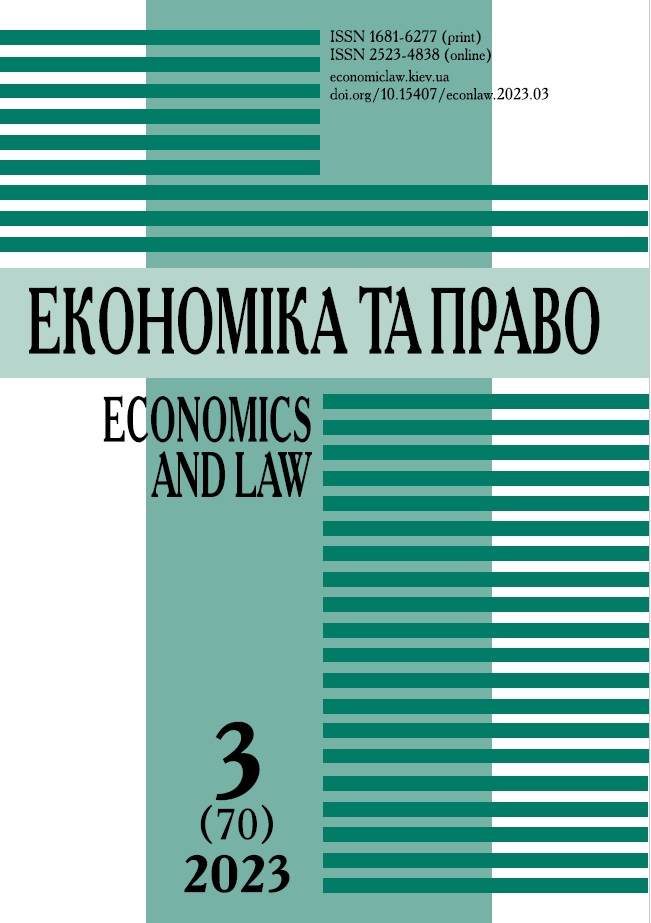НАПРЯМИ КООРДИНАЦІЇ НОРМАТИВНОГО РЕГУЛЮВАННЯ ВІДПОВІДАЛЬНОГО (ESG) ІНВЕСТУВАННЯ У СВІТІ: ФРАГМЕНТАЦІЯ ЧИ УНІФІКАЦІЯ?
DOI:
https://doi.org/10.15407/econlaw.2023.03.091Ключові слова:
відповідальне інвестування, ESG, сталий розвиток, нормативне регулювання, координація дій, звітність зі сталого розвитку, фрагментація, уніфікаціяАнотація
На сьогодні процеси координації нормативного регулювання відповідального (Environmental, Social, and Corporate Governance, ESG) інвестування характеризуються поєднанням фрагментації та зусиль до уніфікації. Існує помітний ступінь фрагментації нормативно-правового ландшафту для відповідального інвестування. На рівні різних регіонів і країн активно розробляються та вдосконалюються власні нормативні рамки, стандарти та вказівки щодо розкриття ESG інформації та звітності зі сталого розвитку. Ця фрагментація створює труднощі для інвесторів і компаній, які працюють у різних юрисдикціях, оскільки вони повинні орієнтуватися та відповідати різноманітним вимогам. Водночас нарощуються зусилля щодо уніфікації та гармонізації ESG правил щодо розкриття інформації та регулювання. Визнаючи глобальний характер ESG викликів, міжнародні організації працюють над установленням спільних принципів і стандартів. Хоча тенденція до уніфікації є перспективною, досягнення повної регулятивної координації відповідального інвестування залишається складним. Різні політичні пріоритети, культурні та економічні відмінності між країнами перешкоджають створенню загальновизнаної нормативної бази. Однак щораз більше визнання важливості ESG і колективні зусилля зацікавлених сторін у всьому світі свідчать про поступове наближення до узгоджених ESG правил.
Посилання
KPMG Regulatory Barometer — H1 2023. KPMG. URL: https://kpmg.com/xx/en/home/insights/2022/08/regulatory-barometer.html#index-01
Regulation database. UNPRI. URL https://www.unpri.org/policy/regulation-database
2022 ESG Trends to Watch. MSCI. 2022. URL: https://www.msci.com/documents/10199/9d2eeece-c2db-3d86-873f-faaac8cd62ef
European Green Deal. European Commission. URL: https://commission.europa.eu/strategy-and-policy/priorities-2019-2024/european-green-deal_en
Matos P. ESG and Responsible Institutional Investing Around the World: A Critical Review. SSRN Electronic Journal. 2020. https://doi.org/10.2139/ssrn.3668998
Daugaard D., Ding A. Global Drivers for ESG Performance: The Body of Knowledge. Sustainability. 2022. Vol. 14. No. 4. P. 2322. https://doi.org/10.3390/su14042322
Singhania M., Saini N. Quantification of ESG Regulations: A Cross-Country Benchmarking Analysis. Vision: The Journal of Business Perspective. 2021. P. 097226292110541. https://doi.org/10.1177/09722629211054173
van Oostrum C. Sustainability Through Transparency and Definitions: A Few Thoughts on Regulation (EU) 2019/2088 and Regulation (EU) 2020/852. European Company Law. 2021. Vol. 18. Iss. 1. P. 15-21. https://doi.org/10.54648/eucl2021003
Ahlström H., Monciardini D. The Regulatory Dynamics of Sustainable Finance: Paradoxical Success and Limitations of EU Reforms. Journal of Business Ethics. 2021. https://doi.org/10.1007/s10551-021-04763-x
Alessi L., Alemanni B. & Frati G. Financial Regulation for Sustainable Finance in the European Landscape. Information as a Driver of Sustainable Finance. Springer International Publishing, 2022. https://doi.org/10.1007/978-3-030-93768-3
Makarenko I., Makarenko S. Multi-level benchmark system for sustainability reporting: EU experience for Ukraine. Accounting and Financial Control. 2023. Vol. 4. No. 1. P. 41-48. https://doi.org/10.21511/afc.04(1).2023.04
Hoepner A.G.F., Schneider F.I. EU Green Taxonomy Data — A First Vendor Survey. The Economists’ Voice. 2022. https://doi.org/10.1515/ev-2022-0022
Rauter T. The Effect of Mandatory Extraction Payment Disclosures on Corporate Payment and Investment Policies Abroad. Journal of Accounting Research. 2020. Vol. 58. No. 5. P. 1075-1116. https://doi.org/10.1111/1475-679x.12332
Darendeli A., Fiechter P., Hitz J.-M. & Lehmann N. The role of corporate social responsibility (CSR) information in supply-chain contracting: Evidence from the expansion of CSR rating coverage. Journal of Accounting and Economics. 2022. P. 101525. https://doi.org/10.1016/j.jacceco.2022.101525
de Silva Lokuwaduge C. S., de Silva K.M. ESG Risk Disclosure and the Risk of Green Washing. Australasian Business, Accounting and Finance Journal. 2022. Vol. 16. No. 1. P. 146-159. https://doi.org/10.14453/aabfj.v16i1.10
Stolowy H., Paugam L. Sustainability Reporting: Is Convergence Possible? Accounting in Europe. 2023. P. 1-27. https://doi.org/10.1080/17449480.2023.2189016
Schacherer S. Fixing a Broken System? Sustainable Finance Taxonomies and Global Regulatory Governance. SSRN Electronic Journal. 2023. https://doi.org/10.2139/ssrn.4491106
Afolabi H., Ram R., Rimmel G. Harmonization of Sustainability Reporting Regulation: Analysis of a Contested Arena. Sustainability. 2022. Vol. 14. No. 9. P. 5517. https://doi.org/10.3390/su14095517
Leins S. ‘Responsible investment’: ESG and the post-crisis ethical order. Economy and Society. 2020. Vol. 49. No. 1. P. 71-91. https://doi.org/10.1080/03085147.2020.1702414
Mynhardt H., Makarenko I., Plastun A. Standardization of sustainability reporting: rationale for better investment decision-making. Public and Municipal Finance. 2017. Vol. 6. No. 2. P. 7-15. https://doi.org/10.21511/pmf.06(2).2017.01
Redondo Alamillos R., de Mariz F. How Can European Regulation on ESG Impact Business Globally? Journal of Risk and Financial Management. 2022. Vol. 15. No. 7. P. 291. https://doi.org/10.3390/jrfm15070291
ECB sets deadlines for banks to deal with climate risks. European Central Bank. URL: https://www.bankingsupervision.europa.eu/press/pr/date/2022/html/ssm.pr221102~2f7070c567.en.html
ESMA launches a consultation on guidelines for the use of ESG or sustainability-related terms in funds’ names. European Securities and Markets Authority. URL: https://www.esma.europa.eu/press-news/esma-news/esmalaunches-consultation-guidelines-use-esg-or-sustainability-related-terms
New rules on climate-related disclosures to help investors, clients and consumers. FCA. URL: https://www.fca.org.uk/news/news-stories/new-rules-climate-related-disclosures-help-investors-clients-consumers
ESG and Climate Trends to Watch for 2023. MSCI. 2023. URL: https://www.msci.com/documents/1296102/35124068/ESG+and+Climate+Trends+to+Watch+for+2023.pdf
SEC Adopts Rules to Enhance Climate and ESG Disclosures for Investors. U.S. Securities and Exchange Commission. URL: https://www.sec.gov/news/press-release/2022-46
Canada ESG Reporting: The Comprehensive Guide. Brightest. URL: https://commission.europa.eu/strategy-andpolicy/priorities-2019-2024/european-green-deal_en
Introduction of Sustainability Preferences: EU MiFID II & IDD. NordESG. URL: https://nordesg.de/en/introduction-of-sustainability-preferences-under-eu-mifid-ii-idd/
Convergence of global sustainability reporting standards. Ethical Boardroom. URL: https://ethicalboardroom.com/convergence-of-global-sustainability-reporting-standards/
Bose S. Evolution of ESG Reporting Frameworks. Values at Work. 2020. P. 13—33. https://doi.org/10.1007/978-3-030-55613-6_2
Database. Statista. URL: https://www.statista.com/statistics/1266650/share-reporting-frameworks-mentioned-stockexchange-esg-guidance-worldwide/
Abhayawansa S. Swimming against the tide: back to single materiality for sustainability reporting. Sustainability Accounting, Management and Policy Journal. 2022. https://doi.org/10.1108/sampj-07-2022-0378
Jørgensen S., Mjøs A., Pedersen L. J. T. Sustainability reporting and approaches to materiality: tensions and potential resolutions. Sustainability Accounting, Management and Policy Journal. 2021. Vol. 13. No. 2. P. 341-361. https://doi.org/10.1108/sampj-01-2021-0009
de Arriba-Sellier N. The International Regulation and Coordination of Sustainable Finance. Netherlands Yearbook of International Law. The Hague, 2023. P. 191-222. https://doi.org/10.1007/978-94-6265-587-4_8


